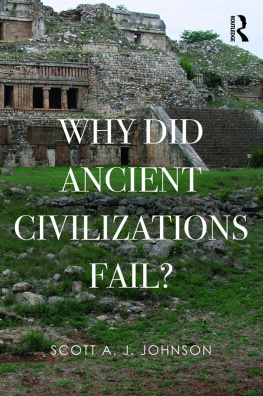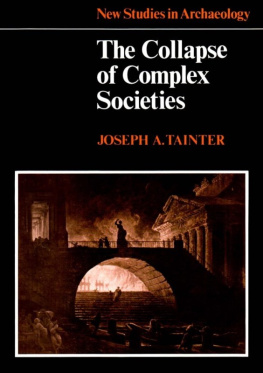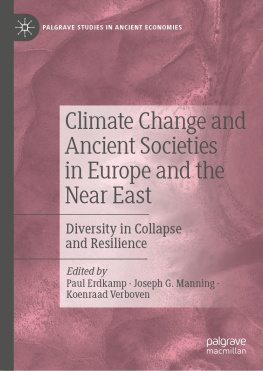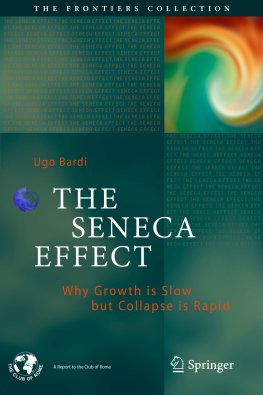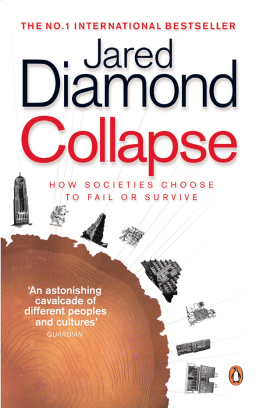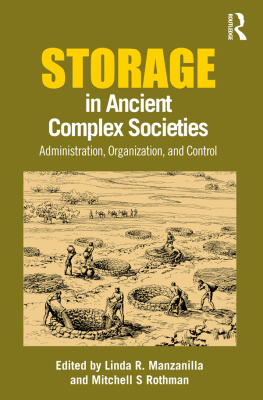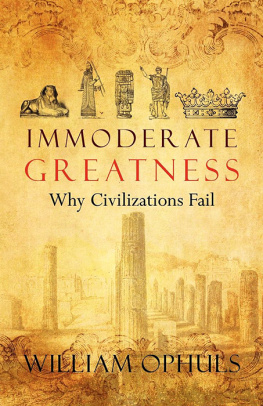
WHY DID ANCIENT
CIVILIZATIONS FAIL?
Ideas abound as to why certain complex societies collapsed in the past, including environmental change, subsistence failure, fluctuating social structure and lack of adaptability. Why Did Ancient Civilizations Fail? evaluates the current theories in this important topic and discusses why they offer only partial explanations of the failure of past civilizations. This engaging book offers a new theory of collapse, that of social hubris. Through an examination of Mesopotamian, Egyptian, Roman, Maya, Inca, and Aztec societies, Johnson persuasively argues that hubris blinded many ancient peoples to evidence that would allow them to adapt, and he further considers how this has implications for contemporary societies. Comprehensive and well written, this volume serves as an ideal text for undergraduate courses on ancient complex societies, as well as appealing to the scholar interested in societal collapse.
Scott A. J. Johnson is a Maya archaeologist who also studies ancient writing and subsistence. Since receiving his Ph.D. in anthropology from Tulane University in 2012, he has taught at various colleges and universities in the United States and Canada. Johnson writes extensively on archaeological methods and the Maya, authoring Translating Maya Hieroglyphs. He is currently the director of the Emal Archaeological Project in Yucatan and a Research Associate at Washington University in Saint Louis.
WHY DID ANCIENT
CIVILIZATIONS FAIL?
Scott A. J. Johnson

First published 2017
by Routledge
711 Third Avenue, New York, NY 10017
and by Routledge
2 Park Square, Milton Park, Abingdon, Oxon OX14 4RN
Routledge is an imprint of the Taylor & Francis Group, an informa business
2017 Taylor & Francis
The right of Scott A. J. Johnson to be identified as author of this work has been asserted by him in accordance with sections 77 and 78 of the Copyright, Designs and Patents Act 1988.
All rights reserved. No part of this book may be reprinted or reproduced or utilised in any form or by any electronic, mechanical, or other means, now known or hereafter invented, including photocopying and recording, or in any information storage or retrieval system, without permission in writing from the publishers.
Trademark notice: Product or corporate names may be trademarks or registered trademarks, and are used only for identification and explanation without intent to infringe.
British Library Cataloguing-in-Publication Data
A catalogue record for this book is available from the British Library
Library of Congress Cataloging-in-Publication Data
A catalog record for this title has been requested
ISBN 978-1-62958-282-5 (hbk)
ISBN 978-1-62958-283-2 (pbk)
ISBN 978-1-315-51289-1 (ebk)
Typeset in Times New Roman
by Swales & Willis Ltd, Exeter, Devon, UK
For Aldo Leopold, Arne Naess, and everybody who has worked for the cause.
This book was inspired by a few specific events that brought the problems facing our world to the forefront of my attention. First, I taught two classes while living in northern Alberta, Canada, just south of the tar-sands oil patch. One class was a survey of circumpolar traditional peoples. In preparation for that course I caught up on the climate science concerning the Arctic. That was in 2012, when the Arctic ice cap set yet another record for melt-off. I learned that permafrost acreage had reduced drastically over the last century. When things warm up, bands of climate-dependent vegetation move toward the poles. As things stand now, the Arctic environment cannot retreat any farther to the north, and the Arctic as we know it is disappearing. In that class, I had a student quip that she did not care if polar bears died out because she did not eat polar bears. I answered with some facts about other effects of global warming, but, as usual, I only came up with a good rejoinder later: if you do not care about a dead canary in the mine because you are not a canary, you are going to be a dead miner. It was at the time that this student expressed her indifference to polar bears that I began writing this book.
The second class I taught that semester was world prehistory. In it, I traced the rise and fall of the worlds ancient complex societies. It was during a class discussion that I first hit upon the idea of social hubris as the causal link in the decline of every civilization. Part of the reason societies develop hubris is that they cannot see that the systems supporting their way of life are linked together. Today, many people see global problems in isolation (e.g., global warming, poverty, violence, famine), when in fact they are all connected. For example, if one hears that the earths average temperature rose 0.6 C in the last century, and may rise another 14 C (1.87.2 F) in the next century (Meehl et al. 2005; Le Treut et al. 2007), it is not really that scary, as we can easily turn up our air conditioning to compensate for a few hot days. If, however, one understands the links between rising temperatures, variable rainfall, changing ecological zones, adversely affected agricultural systems reliant on only a few types of crops, increased energy consumption associated with rising temperatures, and greater reliance on transported food, the scope of the problems facing our society comes into focus. I hope that this book provides a deeper historical context to the crises our global community will experience in the coming century.
Note
For those of you new to this analogy, canaries were lowered into preindustrial mines and left overnight. If a canary was dead in the morning, miners knew not to enter the mine because poisonous gas had permeated the air.
This project would not have been possible without the help, encouragement, and support of many people and a few institutions. I started writing the book as a visiting faculty member at Grande Prairie Regional College, in Alberta, Canada. Thank you to the faculty, students, and friends I made on my year up north, especially Alan Segal, Ren Gadacz, and Connie Korpan. As I approached the final chapters of the manuscript, I was taken on as academic staff in the anthropology department of Washington University in Saint Louis. As luck would have it, I was included in three classes that helped shape the final chapter. I was able to sit in on Geoff Childss class on demography and population dynamics, Glenn Stones Culture and Environment course, and Bret Gustafsons Global Energy and the American Dream class. All three helped me rethink ideas on population pressure and energy and introduced me to topics like political ecology and high modernism. Glenns class, especially, was useful in providing a greater depth of resources and ideas about agriculture. Thank you to Geoff, Glenn, Bret, and my other friends at Washington University in Saint Louis, including T. R. Kidder and David Freidel. I am deeply appreciative of two anonymous reviewers who provided feedback on this manuscript as well as of my friend Leslie Warden, who provided welcome and needed feedback on the Egyptian chapter. A thank you must go to the students who gave me a few notes on the opening chapters. Thank you, also, to Felicity Teague, the eagle-eyed copyeditor for this book. Finally, I want to express my deep gratitude to Will Andrews, my advisor at Tulane University, for his friendship and notes on the manuscript. I retain responsibility for any and all mistakes or misstatements that remain in this work.
I would not be who I am without my family. Thank you to my father, Gerald, who keeps me thinking practically, and to my mother, Kelly, who encourages me to think outside the box. My sister, Jamie, and brother, Grant, might not think they contributed to this book, but when I am writing, I often pretend I am writing to them to keep me from falling into the depths of academese (even still, I do not always succeed). Thank you also to my in-laws, the Hamvas Clan (especially Aaron and Paula, who do not seem to mind having an eccentric son-in-law).
Next page
